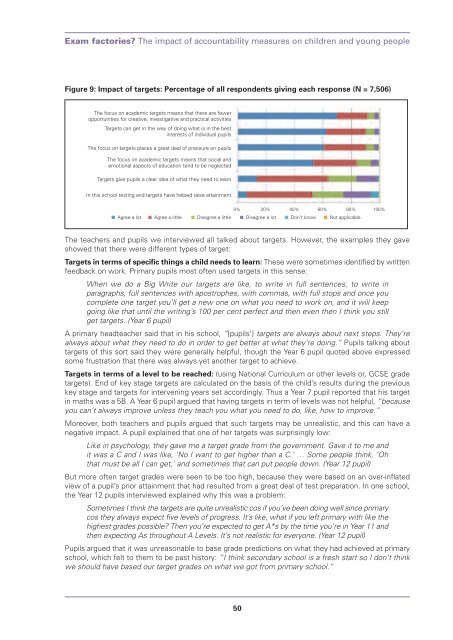exam-factories
exam-factories
exam-factories
Create successful ePaper yourself
Turn your PDF publications into a flip-book with our unique Google optimized e-Paper software.
Exam <strong>factories</strong>? The impact of accountability measures on children and young peopleFigure 9: Impact of targets: Percentage of all respondents giving each response (N = 7,506)The focus on academic targets means that there are feweropportunities for creative, investigative and practical activitiesTargets can get in the way of doing what is in the bestinterests of individual pupilsThe focus on targets places a great deal of pressure on pupilsThe focus on academic targets means that social andemotional aspects of education tend to be neglectedTargets give pupils a clear idea of what they need to learnIn this school testing and targets have helped raise attainment0% 20% 40% 60% 80% 100%Agree a lot Agree a little Disagree a little Disagree a lot Don’t know Not applicableThe teachers and pupils we interviewed all talked about targets. However, the <strong>exam</strong>ples they gaveshowed that there were different types of target:Targets in terms of specific things a child needs to learn: These were sometimes identified by writtenfeedback on work. Primary pupils most often used targets in this sense:When we do a Big Write our targets are like, to write in full sentences, to write inparagraphs, full sentences with apostrophes, with commas, with full stops and once youcomplete one target you’ll get a new one on what you need to work on, and it will keepgoing like that until the writing’s 100 per cent perfect and then even then I think you stillget targets. (Year 6 pupil)A primary headteacher said that in his school, “[pupils’] targets are always about next steps. They’realways about what they need to do in order to get better at what they’re doing.” Pupils talking abouttargets of this sort said they were generally helpful, though the Year 6 pupil quoted above expressedsome frustration that there was always yet another target to achieve.Targets in terms of a level to be reached: (using National Curriculum or other levels or, GCSE gradetargets). End of key stage targets are calculated on the basis of the child’s results during the previouskey stage and targets for intervening years set accordingly. Thus a Year 7 pupil reported that his targetin maths was a 5B. A Year 6 pupil argued that having targets in term of levels was not helpful, “becauseyou can’t always improve unless they teach you what you need to do, like, how to improve.”Moreover, both teachers and pupils argued that such targets may be unrealistic, and this can have anegative impact. A pupil explained that one of her targets was surprisingly low:Like in psychology, they gave me a target grade from the government. Gave it to me andit was a C and I was like, ‘No I want to get higher than a C.’ … Some people think, ‘Ohthat must be all I can get,’ and sometimes that can put people down. (Year 12 pupil)But more often target grades were seen to be too high, because they were based on an over-inflatedview of a pupil’s prior attainment that had resulted from a great deal of test preparation. In one school,the Year 12 pupils interviewed explained why this was a problem:Sometimes I think the targets are quite unrealistic cos if you’ve been doing well since primarycos they always expect five levels of progress. It’s like, what if you left primary with like thehighest grades possible? Then you’re expected to get A*s by the time you’re in Year 11 andthen expecting As throughout A Levels. It’s not realistic for everyone. (Year 12 pupil)Pupils argued that it was unreasonable to base grade predictions on what they had achieved at primaryschool, which felt to them to be past history: “I think secondary school is a fresh start so I don’t thinkwe should have based our target grades on what we got from primary school.”50


